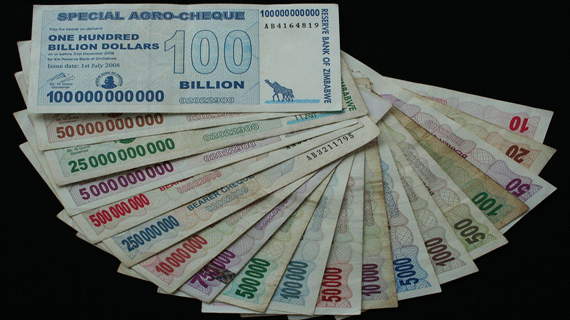
THE GOVERNMENT needs to compensate Zimbabweans who lost their life savings and pensions when it adopted foreign currencies in 2009 to replace a collapsed local unit, if confidence in the banking sector is to be restored, an industry official said on Friday.
Presenting oral evidence to the Parliamentary portfolio committee on indigenisation and empowerment, Bankers’ Association of Zimbabwe (BAZ) president George Guvamatanga said conflicting political statements on whether the Zimbabwe dollar would be reintroduced also undermined public confidence in banks.
“The general confidence in the banking sector at the moment is low. Those people who had Zimbabwe dollar balances when we moved to US dollar should get their money,” he said.
He said there was need to set a rate of exchange to convert the money “so that we make it clear to our people that you don’t take your money into a bank and you wake up tomorrow and you don’t find it.”
The government says it has set aside $20 million to “demonetise” Zimbabwe dollar bank balances held at the time the country effectively dollarised in February 2009.
Referring to President Robert Mugabe and his Zanu PF party’s campaign rhetoric on the reintroduction of the local currency ahead of last year’s elections, Guvamatanga said: “When you then go to rallies and people say we don’t have United States dollars and you tell the same people that we will bring the Zimbabwe dollar tomorrow, the same people will not take their money to the bank because they are now afraid (to lose their money).”
Guvamatanga, who is the managing director of Barclays Bank Zimbabwe, said it was difficult to change the negative perceptions that the local currency could return despite government assurances that it had no such plans in the short-term.
“Yes, honourable chairperson, for now people are afraid of the Zimbabwe dollar,” he said.
- Chamisa under fire over US$120K donation
- Mavhunga puts DeMbare into Chibuku quarterfinals
- Pension funds bet on Cabora Bassa oilfields
- Councils defy govt fire tender directive
Keep Reading
Guvamatanga admitted that BAZ had also failed to educate depositors about the different types of accounts and how to bank cheaper as most people were shunning banks due to high charges. Guvamatanga said the association was carrying out a study, to be completed by mid-June, to establish how much money was circulating outside the banking sector.
He attributed high bank charges to the charges accrued to transport cash from the United States, including its security, but said there was need to come up with a model that allows bankers to recoup their costs. Responding to questions on some indigenous banks that were failing to pay depositors their money, Guvamatanga said those banks were breaking the law, but also called on the government to restore the central bank’s lender of last resort role to provide liquidity in the market.
—The Source.










